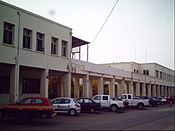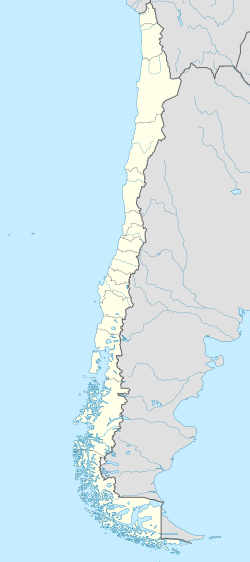Cauquenes facts for kids
Quick facts for kids
Cauquenes
|
|||||
|---|---|---|---|---|---|
 |
|||||
|
|||||
| Country | Chile | ||||
| Region | Maule | ||||
| Province | Cauquenes | ||||
| Founded | 1742 | ||||
| Government | |||||
| • Type | Municipality | ||||
| Area | |||||
| • Total | 2,126.3 km2 (821.0 sq mi) | ||||
| As of 2002 | |||||
| Elevation | 135 m (443 ft) | ||||
| Population
(2012 Census)
|
|||||
| • Total | 38,522 | ||||
| • Density | 18.1169/km2 (46.9226/sq mi) | ||||
| • Urban | 30,771 | ||||
| • Rural | 10,446 | ||||
| Demonym(s) | Cauquenino | ||||
| Sex | |||||
| • Men | 20,092 | ||||
| • Women | 21,125 | ||||
| Time zone | UTC-4 (CLT) | ||||
| • Summer (DST) | UTC-3 (CLST) | ||||
| Postal code |
3690000
|
||||
| Area code(s) | 56 + 73 | ||||
| Climate | Csb | ||||
| Website | Official website: http://www.cauquenes.cl/ | ||||
Cauquenes is a city and a commune (which is like a local government area) in Chile. It is the main city, or capital, of the Cauquenes Province and is found in the Maule Region.
Contents
History of Cauquenes
According to old records, Cauquenes was first home to an indigenous group called the Promaucaes. The Inca people called them Cauqui, and the Spanish called them cauquenes. This group lived near the Cauquenes River, which got its name from them. They had a settlement where the city is today.
The city of Cauquenes was officially founded on May 9, 1742. It was first named "Villa of Nuestra Señora de las Mercedes de José de Manso del Tutuvén". The land for the city was given by an indigenous leader, a cacique named Ascensio Galdámez, and his wife Micaela de Araya. The person who founded the city was José Antonio Manso de Velasco, who was the Governor of Chile at that time.
Over time, the city's name changed. In 1826, it became "Villa de Cauquenes". Later that same year, it was finally given the name "Cauquenes". The name "Cauquenes" comes from the word "cauque". This was a type of fish, similar to a salmon, that used to live in the rivers of the area but is now extinct.
2010 Earthquake Impact
On February 27, 2010, Cauquenes was hit by a very strong earthquake (8.8 magnitude). A large ocean wave, called a tsunami, followed the earthquake. The city suffered a lot of damage, and it was impossible to get electricity back on right away because of how badly things were broken.
People and Population
Based on the 2002 census, Cauquenes covers an area of about 2,126 square kilometers. It had 41,217 people living there at that time. Out of these, 20,092 were men and 21,125 were women.
Most of the people, about 30,771 (74.7%), lived in urban areas, which means in the city itself. The rest, about 10,446 (25.3%), lived in rural areas, which are the countryside parts of the commune. Between 1992 and 2002, the number of people living in Cauquenes grew by 2.3%.
Other smaller towns and places within the Cauquenes commune include:
- Sauzal, with 521 people
- Quella, with 346 people
- Santa Sofía, with 612 people
Geography of Cauquenes
Cauquenes is located at:
- Altitude: 136 meters (about 446 feet) above sea level
- Latitude: 35° 58' S (South)
- Longitude: 072° 21' W (West)
How Cauquenes is Governed
As a commune, Cauquenes is a local government area in Chile. It is managed by a municipal council. The leader of the council is called an alcalde, who is like a mayor. The alcalde is chosen by the people in an election every four years. The alcalde from 2008 to 2012 was Juan Carlos Muñoz Rojas.
The municipal council members during that time were:
- Hernán Valenzuela Sepúlveda (PDC)
- Luis Ceroni García (PPD)
- Guillermo García González (UDI)
- Domingo Leiva Mena (PS)
- Manuel Vergara Del Río (RN)
- Alejandra Concha Urrutia (PPD)
Cauquenes is also part of larger areas for national elections. For the Chamber of Deputies (which is like one part of the country's parliament), Cauquenes is in the 18th electoral district. Its representatives were Ignacio Urrutia (UDI), Rolando Rentería (UDI), Manuel Matta (PDC), and Jaime Naranjo (PS).
For the Senate (the other part of the country's parliament), Cauquenes is part of the 9th senatorial constituency (Maule). Its senators were Ximena Rincón González (PDC), Juan Castro Prieto (Ind-RN), Rodrigo Galilea Vial (RN), Juan Antonio Coloma Correa (UDI), and Álvaro Elizalde Soto (PS).
Climate
Cauquenes has a warm-summer Mediterranean climate, which means it has hot, dry summers and mild, wet winters.
| Climate data for Cauquenes | |||||||||||||
|---|---|---|---|---|---|---|---|---|---|---|---|---|---|
| Month | Jan | Feb | Mar | Apr | May | Jun | Jul | Aug | Sep | Oct | Nov | Dec | Year |
| Mean daily maximum °C (°F) | 29.2 (84.6) |
28.3 (82.9) |
26.6 (79.9) |
22.3 (72.1) |
17.8 (64.0) |
13.8 (56.8) |
13.5 (56.3) |
14.7 (58.5) |
17.5 (63.5) |
19.5 (67.1) |
23.6 (74.5) |
26.3 (79.3) |
21.1 (70.0) |
| Daily mean °C (°F) | 22.0 (71.6) |
20.2 (68.4) |
21.6 (70.9) |
14.6 (58.3) |
13.9 (57.0) |
9.8 (49.6) |
8.7 (47.7) |
9.8 (49.6) |
11.6 (52.9) |
13.6 (56.5) |
18.1 (64.6) |
19.9 (67.8) |
15.3 (59.6) |
| Mean daily minimum °C (°F) | 12.8 (55.0) |
11.6 (52.9) |
9.9 (49.8) |
7.7 (45.9) |
6.3 (43.3) |
5.2 (41.4) |
4.0 (39.2) |
3.8 (38.8) |
5.0 (41.0) |
6.4 (43.5) |
8.8 (47.8) |
11.2 (52.2) |
7.7 (45.9) |
| Average precipitation mm (inches) | 8.1 (0.32) |
6.5 (0.26) |
15.5 (0.61) |
36.8 (1.45) |
110.3 (4.34) |
153.3 (6.04) |
131.4 (5.17) |
97.2 (3.83) |
56.9 (2.24) |
29.5 (1.16) |
15.8 (0.62) |
9.5 (0.37) |
670.8 (26.41) |
| Source: Meteorología Interactiva | |||||||||||||
Images for kids
See also
 In Spanish: Cauquenes para niños
In Spanish: Cauquenes para niños
 | Georgia Louise Harris Brown |
 | Julian Abele |
 | Norma Merrick Sklarek |
 | William Sidney Pittman |





